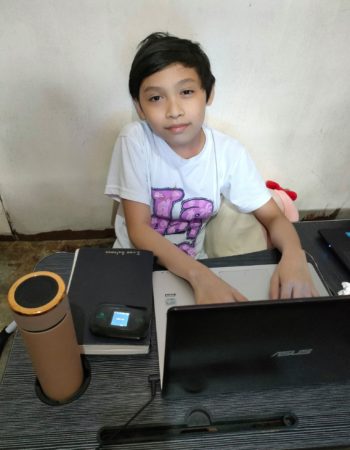Then 10-year old Ioan Salomon was on his way to another year of academic excellence at Kapitan Moy Elementary School in Marikina City when the COVID-19 pandemic struck in 2020.
The government prohibited face-to-face classes to protect both students and teachers. To continue their education, the Department of Education pushed for blended learning, using both broadcast media and the internet.
The consistent honors student was devastated. “We were caught off guard. I didn’t have my own laptop,” recalled Salomon.
Buying a new unit was out of the question. The pandemic also cost his stepfather his job as a Transport Network Vehicle Service (TNVS) driver.

“My mom had to bring out her old laptop to have it repaired so I could attend online classes,” he said.
Salomon also faced another problem for e-learning – the lack of a reliable internet of his own. Salomon and his family are currently staying with his stepfather’s parents. They share the connection with other members of the household, who also use the internet for their online businesses.
So, it was a relief for the Grade 6 student when his school announced that he will be receiving his own Smart Bro LTE Pocket WiFi unit, courtesy of a donation drive organized by a group of college students.
“I am grateful I was chosen as one of the beneficiaries. Smart’s connection is very stable, allowing me to connect to my online classes better,” said Salomon.
The timely and generous assistance came from 20-year-old Micaela Gavino and her friends, who in July 2020, organized a gadget donation drive for public school students in Marikina called ‘Salindiwa’. Gavino said they were moved by the struggles of students and their parents asking for gadgets and connectivity for online learning.
Backed by Smart Communications, Inc. (Smart), she and her friends turned over at least a hundred Smart Bro Pocket WiFi devices to Kapitan Moy Elementary School in September last year. And to make the donation more sustainable, the group continues to raise funds to provide more deserving beneficiaries with monthly data allowance for the rest of the school year.
“It’s good that Ioan now has his own connection. The monthly load allowance is a huge help for us. Instead of paying for his data load, we can use the money to augment our family’s daily needs,” said Salomon’s mother Joey Ann Nalus.
“Smart supports students as they navigate the new normal. We’re always on the lookout for their changing needs so we can launch products and services that will help them live smarter for a better world,” said Jane J. Basas, Smart SVP and Head of Consumer Wireless Business. The products and services of Smart, and its parent firm PLDT, underscore the companies’ broad advocacy to promote digital inclusion. These initiatives also aim to contribute to the achievement of the United Nations’ Sustainable Development Goals, particularly UN SDG #4: providing quality education.
“I’m very proud of Ioan because even if he faced challenges transitioning to online learning, he still managed to excel in his studies. He gave his best to get good grades and he has learned to adapt to the new normal,” said Nalus.
Now that Salomon has his own internet connection, he is able to concentrate on his studies. And it looks like he’s on his way to another year of academic excellence.

